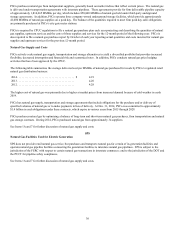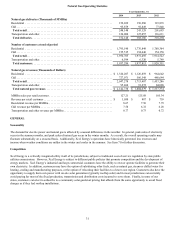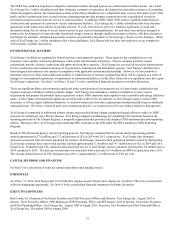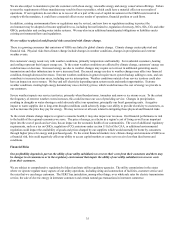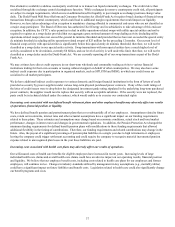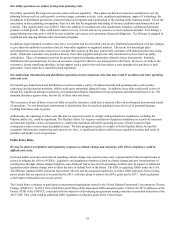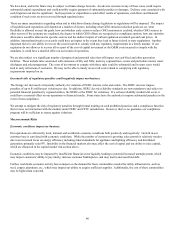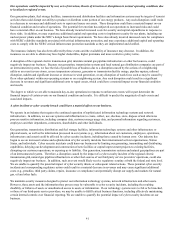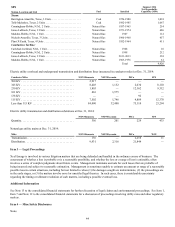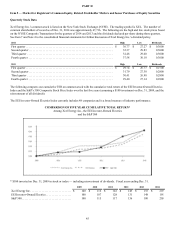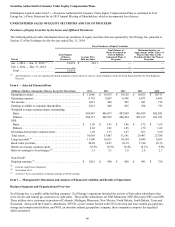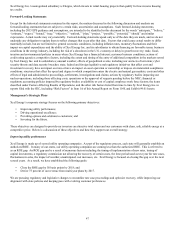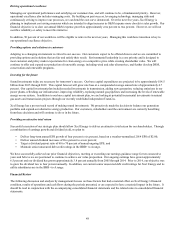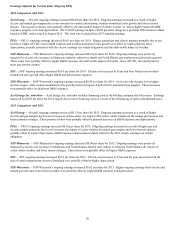Xcel Energy 2014 Annual Report Download - page 58
Download and view the complete annual report
Please find page 58 of the 2014 Xcel Energy annual report below. You can navigate through the pages in the report by either clicking on the pages listed below, or by using the keyword search tool below to find specific information within the annual report.40
We have been, and in the future may be subject to climate change lawsuits. An adverse outcome in any of these cases could require
substantial capital expenditures and could possibly require payment of substantial penalties or damages. Defense costs associated with
such litigation can also be significant. Such payments or expenditures could affect results of operations, cash flows and financial
condition if such costs are not recovered through regulated rates.
There are many uncertainties regarding when and in what form climate change legislation or regulations will be imposed. The impact
of legislation and regulations will depend on a number of factors, including what GHG emission reduction goals are set, what
flexibility is allowed to meet the goals, how and whether early action to reduce GHG emissions is credited, whether GHG sources in
other sectors of the economy are regulated, the degree to which GHG offsets are recognized as compliance options, how any emission
allowances would be allocated to specific sources and the indirect impact of carbon regulation on natural gas and coal prices. In
addition, international treaties or accords could have an impact to the extent they lead to future federal or state regulations. Another
important factor is our ability to recover the costs incurred to comply with any regulatory requirements in a timely manner. If our
regulators do not allow us to recover all or a part of the cost of capital investment or the O&M costs incurred to comply with the
mandates, it could have a material effect on our results of operations.
We are also subject to a significant number of proposed and potential rules that will impact our coal-fired and other generation
facilities. These include rules associated with emissions of SO2 and NOx, mercury, regional haze, ozone and particulate matter, water
discharges and ash management. The costs of investment to comply with these rules could be substantial and in some cases would
lead to early retirement of coal units. We may not be able to timely recover all costs related to complying with regulatory
requirements imposed on us.
Increased risks of regulatory penalties could negatively impact our business.
The Energy Act increased civil penalty authority for violation of FERC statutes, rules and orders. The FERC can now impose
penalties of up to $1 million per violation per day. In addition, NERC electric reliability standards are now mandatory and subject to
potential financial penalties by regional entities, the NERC or the FERC for violations. If a serious reliability incident did occur, it
could have a material effect on our operations or financial results. Some states have the authority to impose substantial penalties in the
event of non-compliance.
We attempt to mitigate the risk of regulatory penalties through formal training on such prohibited practices and a compliance function
that reviews our interaction with the markets under FERC and CFTC jurisdictions. However, there is no guarantee our compliance
program will be sufficient to ensure against violations.
Macroeconomic Risks
Economic conditions impact our business.
Our operations are affected by local, national and worldwide economic conditions both positively and negatively. Growth in our
customer base is correlated with economic conditions. While the number of customers is growing, sales growth is relatively modest
due to an increased focus on energy efficiency including federal standards for appliance and lighting efficiency and distributed
generation, primarily solar PV. Instability in the financial markets also may affect the cost of capital and our ability to raise capital,
which are discussed in the capital market risk section above.
Economic conditions may be impacted by insufficient financial sector liquidity leading to potential increased unemployment, which
may impact customers’ ability to pay timely, increase customer bankruptcies, and may lead to increased bad debt.
Further, worldwide economic activity has an impact on the demand for basic commodities needed for utility infrastructure, such as
steel, copper, aluminum, etc., which may impact our ability to acquire sufficient supplies. Additionally, the cost of those commodities
may be higher than expected.


